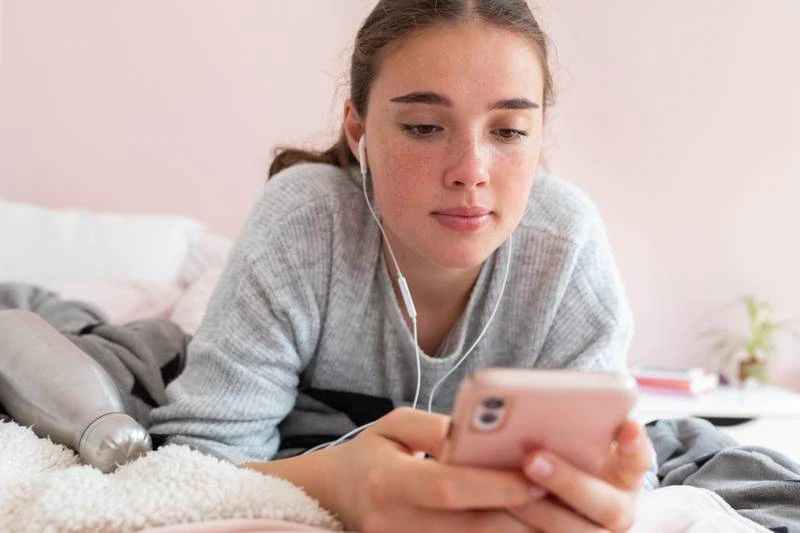Warning social media adversely affects young girls more than boys

Girls aged 11 to 13 are more likely to be detrimentally affected by social media than their male counterparts, a study has found. It is when boys reach the 14-15 mark that they start to feel its negative consequences, the research suggested.
The joint study between the Universities of Oxford and Cambridge ascribed the findings to biological factors, with structural brain changes and puberty occurring later in boys than girls. Separately, the study found greater social media use by people at the age of 19 was correlated to lower life satisfaction, although this link was not statistically significant in other age groups.
Researchers identified environmental rather than biological factors for this finding, with 19 often being a time of flux for many leaving home or starting university or work for the first time. The study, published in Nature Communications, monitored 17,400 people aged 10 to 21 over a period of time and its findings corroborate other studies which have suggested mental health conditions are becoming more prevalent among children in the UK.Read More : The digital drug: Internet addiction spawns US treatment programs The effect the often polarised and angry world of social media can have on such a "period of transition" in life has huge potential for destabilisation, the researchers said. "We change a huge amount in terms of our cognitive abilities and our social cognition, our social awareness and our emotion processing during adolescence," said Sarah-Jayne Blakemore, professor of psychology at the University of Cambridge.
"The social world [also] changes a huge amount in adolescence. We go from little primary schools to big secondary schools, we have a huge number of new people we have to interact with, peers take on heightened importance in adolescence and young people have to work out where they are in the complex and changing social hierarchy. "This is a really vulnerable period of life already and social media comes in and kind of amplifies that."
Sleep deprivation a huge concern
Prof Blakemore also highlighted how useful social media has been during pandemic lockdowns for helping young people to stay in touch. Covid-19 has been linked to significant mental health issues.
However, the overall tenor of the findings was negative. "Whether it's pornography, or things like graphic images of war that you can't get away from as soon as you turn on your phone at the moment," said Prof Blakemore. "There's also things like sleep. It's not just about what people are doing with social media, but also when.
"Young people's lives are so full during the day of school, and then after-school activities, that the one time they have to communicate with their friends, to check out their social media, is often in the evening quite late at night. "We know that sleep is so crucial for well-being and mood and cognitive development in adolescence. So depriving adolescents of sleep because of their social media use is going to be a negative thing." The researchers called for better education of young people to reduce these effects.
The joint study between the Universities of Oxford and Cambridge ascribed the findings to biological factors, with structural brain changes and puberty occurring later in boys than girls. Separately, the study found greater social media use by people at the age of 19 was correlated to lower life satisfaction, although this link was not statistically significant in other age groups.
Researchers identified environmental rather than biological factors for this finding, with 19 often being a time of flux for many leaving home or starting university or work for the first time. The study, published in Nature Communications, monitored 17,400 people aged 10 to 21 over a period of time and its findings corroborate other studies which have suggested mental health conditions are becoming more prevalent among children in the UK.
"The social world [also] changes a huge amount in adolescence. We go from little primary schools to big secondary schools, we have a huge number of new people we have to interact with, peers take on heightened importance in adolescence and young people have to work out where they are in the complex and changing social hierarchy. "This is a really vulnerable period of life already and social media comes in and kind of amplifies that."
Sleep deprivation a huge concern
Prof Blakemore also highlighted how useful social media has been during pandemic lockdowns for helping young people to stay in touch. Covid-19 has been linked to significant mental health issues.
However, the overall tenor of the findings was negative. "Whether it's pornography, or things like graphic images of war that you can't get away from as soon as you turn on your phone at the moment," said Prof Blakemore. "There's also things like sleep. It's not just about what people are doing with social media, but also when.
"Young people's lives are so full during the day of school, and then after-school activities, that the one time they have to communicate with their friends, to check out their social media, is often in the evening quite late at night. "We know that sleep is so crucial for well-being and mood and cognitive development in adolescence. So depriving adolescents of sleep because of their social media use is going to be a negative thing." The researchers called for better education of young people to reduce these effects.
Source: www.thenationalnews.com
